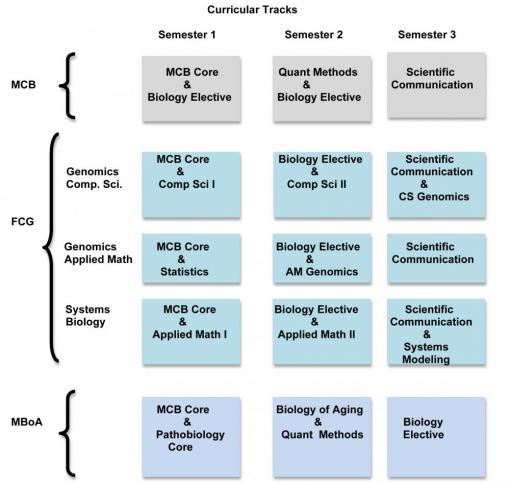MCB students are required to successfully complete a minimum of five courses worth six credits for the doctoral degree. Typically, MCB students will complete the course work outlined below during their first three semesters.
 The course work is anchored by two core classes; a literature-based class on multidisciplinary experimental approaches to biological questions (BIOL2030 "Foundations for Advanced Study in Experimental Biology," two credits) in the first semester, and a class on scientific communication skills (BIOL2150 "Scientific Communication," one credit) in the third semester.
The course work is anchored by two core classes; a literature-based class on multidisciplinary experimental approaches to biological questions (BIOL2030 "Foundations for Advanced Study in Experimental Biology," two credits) in the first semester, and a class on scientific communication skills (BIOL2150 "Scientific Communication," one credit) in the third semester.
Upon matriculation, students may choose among three curricular tracks. The MCB track provides advanced training in cell, developmental, and molecular biology, and biochemistry; the FCG track provides advanced training in computational and systems biology, and the MBoA track provides training in the molecular mechanisms of aging. Each of the tracks incorporates quantitative methodologies into the analysis of biological systems but emphasizes different approaches.
Training in Molecular Biology, Cell Biology and Biochemistry (MCB)
Students interested in pursuing advanced study in the life sciences may choose the MCB curricular track as their course of study once admitted to the MCB Graduate Program. The MCB curriculum is aimed at students with a primary interest in molecular biology, cell biology, developmental biology, proteomics and/or biochemistry.
MCB students will gain instruction in quantitative approaches to biological processes including statistics and bioinformatics through "Quantitative Approaches in Biology" (BIOL2010, one credit) during the second semester. The goals of this course are to strengthen necessary mathematical skills and to gain understanding of quantitative approaches required to address complex problems in modern biology.
MCB students can tailor their course work to the disciplines specifically related to their interests through a combination of didactic courses and topical seminars offered in each of the disciplines. In addition to BIOL2010, BIOL2030, and BIOL2150, students are expected to complete a minimum of two 2000-level electives, with at least one 2000-level seminar format course, in fulfillment of the requirements for their doctoral degree. The seminar courses are designed to offer students in-depth training in specific topics in molecular biology, cell biology, developmental biology, proteomics and biochemistry.
Training in Functional and Computational Genetics (FCG)
Students with a strong interest in advanced training in both biology and computational approaches may choose FCG curricular track as their course of study once admitted to the MCB graduate program. The FCG curriculum is aimed at students with a primary background in biology, but also with appropriate mathematical preparation (college-level calculus) and interest in applying advanced quantitative methodologies towards the understanding of gene function and regulation in development and disease.
In the second semester, students will supplement their genetic training from BIOL2030 with additional advanced coursework in genetics. Possibilities include "Molecular Genetics " (BIOL2540) or topical seminar offerings in genetics and/or genomics.
The remainder of the formal FCG curriculum is dedicated to developing advanced skills in quantitative approaches to biological problems. Based on their interests, FCG students may choose to tailor their mathematical training along either of two paths:
- Genomics - Students can select between an Applied Mathematics track or a Computer Science track. For the Applied Mathematics track, in the first semester training in statistical analysis of complex datasets will begin with "Statistical Inference" (APMA 1650) and will continue in the second semester with "Inference in Genomics and Molecular Biology" (APMA 1080). For the Computer Science track, training in computer programming will be achieved through "Introduction to Object-Oriented Programming and Computer Science" (CSCI 0150) in the first semester and "Introduction to Algorithms and Data Structures" (CSCI0160) in the second semester, or through "Computer Science: An Integrated Introduction" (CSCI 0170 fall/CSCI 0180 spring). The training will continue in the third semester with "Computational Molecular Biology" (CSCI 1810).
- Systems Biology - In the first semester, training in the mathematical modeling of biological systems will begin with "Methods of Applied Mathematics I" (APMA 0330 or APMA 0350). The choice between the APMA courses is based on the student’s interests. APMA 0330 emphasizes the application of established methods, while APMA 0350 focuses on the development of methodological foundations. In the second semester, training will continue with "Methods of Applied Mathematics II" (APMA 0340 or APMA 0360). Students interested in systems biology will conclude their formal course work requirement in mathematics with "Quantitative Models of Biological Systems" (APMA 1070) in the third semester.
Training in the Molecular Biology of Aging (MBoA)
Students interested in aging may choose the MBoA track once admitted to the MCB Graduate Program. In the first semester, students will take the MCB core course and the Pathobiology core course. In the second semeser, students will take "Biology of Aging" and "Quantitative Approaches in Biology (BIOL2010). In the third semester, students will take a biology elective.
Students entering with advanced course work
In some circumstances, students may enter the MCB graduate program with previous graduate-level training. To minimize redundancy in course work, these students should submit description(s) of the course(s) or equivalent experience to the Director of the MCB Graduate Program before matriculation. These descriptions should include a syllabus or list of topics, the name(s) of the text(s) or readings, the duration and number of weekly hours in the course, and any other information that might be helpful. The Director of the MCB Graduate Program, in consultation with faculty trainers who have expertise in the subject area, will determine the student’s level of proficiency in that area. The recommendations of the faculty will form part of the pre-registration discussion between the student and the advisory committee. In these cases, students will substitute additional course work, selected in consultation with the advisory committee, to attain the equivalent of the required five courses.
